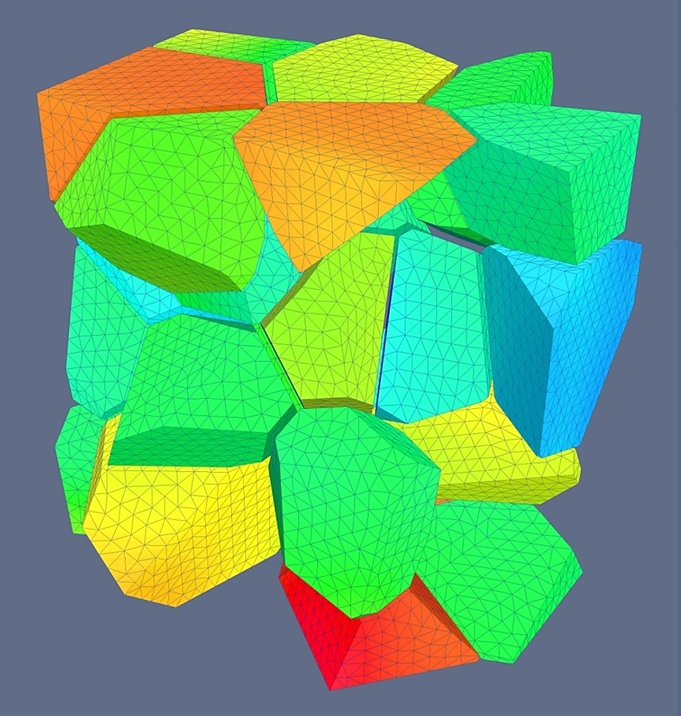On 21 December 2020, in the course of an international online ceremony, the Christian Doppler Research Laboratory for Magnet Design Through Physics Informed Machine Learning opens officially. Over the next seven years, the simulation experts working at the Department for Integrated Sensor Systems at Danube University Krems will together with Toyota conduct research on methods to replace or significantly reduce rare earths for magnets as key components of electric motors by using simulation and artificial intelligence. The new CD-Lab receives funding from the Federal Ministry for Digitalization and Economic Development (BMDW).
Margarete Schramböck, Austrian Federal Minister for Digital and Economic Affairs, endorses the establishment of the new CD-Laboratory: "Electro mobility needs strong electric motors, strong electric motors need strong magnets - and these in turn need rare earths. This CD-Laboratory will help to reduce dependence on these raw materials through scientific research at the highest level. Once again Austria demonstrates the strength of its position as a research location by this international participation."
Johanna Mikl-Leitner, State Governor of Lower Austria: "We care about climate protection and sustainability, today and on our way into the future. Therefore, establishing the Christian Doppler Laboratory for Magnet Design with a number of supporting partners marks an essential step for the physical, worldwide basic research in the field of mobility. In addition, the facility serves as an important component of the Lower Austria research region. After all, our contribution is significant to international research work in practically all relevant areas of science thanks to the scientific axis spanning from Klosterneuburg to Krems, St. Pölten via Tulln and all the way to Wr. Neustadt."
On the occasion of the opening, Prof Viktoria Weber, Vice-Rector for Research at Danube University Krems, emphasized the role of science and universities in tackling major societal challenges such as climate change. "By providing application-oriented research, the new Christian Doppler Research Laboratory makes an important contribution to eco-friendly mobility. International collaboration is required to tackle such major issues through research, as in the new CD-Lab."
Ministry of Digital and Economic Affairs supports new CD-Laboratory
The third CD-Laboratory at Danube University Krems is located in the Department for Integrated Sensor Systems, headed by Prof Hubert Brückl, at the Technology and Research Center TFZ in Wiener Neustadt. Prof Thomas Schrefl is head of the CD-Laboratory. The lab will run for seven years until 2027 and is a cooperation between Danube University Krems and Toyota Motor Corporation, which will bear half of the costs. The Federal Ministry for Digital and Economic Affairs as part of the Christian Doppler Research Laboratories covers the other half of the budget.
Developing new strategies for the design of magnet materials
The CD-Laboratory's goal is to develop new strategies for designing magnets used in electric motors to power e-mobility in order to prevent supply bottlenecks of rare-earth elements. To optimize the magnets, artificial intelligence is utilized to run simulation models on supercomputers.
High-performance magnets play a key role in green technologies such as electro mobility. However, the growing demand for electric vehicles will lead to a shortage of rare earths such as neodymium, and heavy rare earth elements such as terbium and dysprosium. They are essential components for high-temperature permanent magnets such as those installed in e-cars.
Self-developed software suite as a working base
This is where the CD-Lab comes in: In order to reduce the use of rare earths, machine learning methods will be applied to support computer-aided magnet design by integrating physical models across all relevant length scales. In doing so, the CD-Lab builds on a software suite that the Department for Integrated Sensor Systems has developed in-house, which is an amalgamation of several computer programs. This software suite, supported by the computing power of many computers working in parallel, allows the study of magnetization processes based on the smallest magnetic units, the core-shell grains. Thus, their properties can be extrapolated to the level of the whole magnet by machine learning.
The researchers can use such micro magnetic simulations to calculate the magnetic field strength required to demagnetize a permanent magnet (the so-called coercive field). Therefore, training of the regression model, which links the coercive field of a grain with its geometry and rare earth content, is the goal.
Reduction of rare earths as a goal
Thomas Schrefl: "The optimization of the proposed methodology has a twofold potential: on the microscopic level, the chemical composition and the geometry of the core-shell grain are optimized. At the device level, multi-material optimization assigns highly coercive and expensive materials only to regions exposed to strong demagnetizing fields. This can reduce rare earths significantly."
Application-oriented basic research
In Christian Doppler Laboratories, application-oriented basic research is carried out at a high level, with excellent scientists cooperating with innovative companies. The Christian Doppler Research Association is highly regarded internationally as an example of best practice in the promotion of this cooperation.
The Christian Doppler Laboratories are co-financed by the public sector and the participating companies, whereas the Federal Ministry for Digital and Economic Affairs (BMDW) is the most important public funding body.


